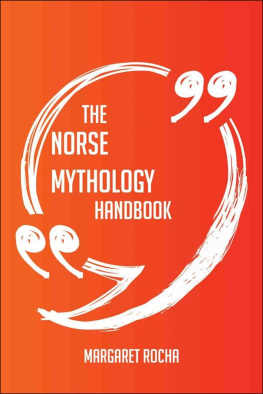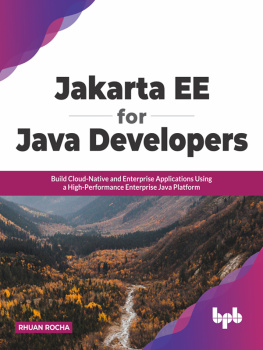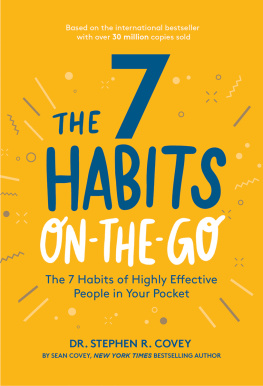14 Habits of Highly Productive Developers
v1.0.0
Date: July 14th, 2020
Site: 14habits.com
Email:
Illustrations by Briza Bueno
Copyright 2020 by Zeno Rocha
ISBN: 978-1-7352665-0-3
14 Habits of Highly Productive Developers
Part One: Principles
Hello World
There is no elevator to success, you have to take the stairs. Zig Ziglar
I started developing software more than ten years ago. Since then, Ive built many applications, created dozens of open source projects, and pushed thousands of commits. Besides that, I spoke in more than a hundred conferences, and had the opportunity to chat with a ton of developers along the way.
I was fortunate enough to be in contact with some of the best software engineers in the industry, but I also met a lot of programmers who are still doing the same thing for many years.
What separates one group from the other? Whats unique about people who work on the biggest companies in our industry? Whats special about individuals who create the most used applications in the world? How can some developers be so prolific at work and also outside their jobs?
These questions stayed on my head for a long time. I realized that I could buy the best mechanical keyboards, go to the most famous tech conferences in the world, and learn all the newest frameworks. Still, if I cultivated bad habits, it would be impossible to become a top developer. Because of that, I decided to reach out to the best developers I know and ask them tips on how to be more productive.
This book doesnt offer a straight path or pre-defined formula for success. This book is the result of a quest. A quest to uncover what habits can be cultivated to help become a better software engineer.
Methodology
This is not a traditional book. You wont find the same format or structure that a regular book has. In fact, this book was designed to be as simple and objective as possible. You can follow the order of chapters, or you can read them individually. Everything is standalone and doesnt depend on previous knowledge.
At the end of each habit, youll find a section marked as Questions & Answers , where I interview senior developers and tech leads from various companies to understand how they got there. I went after tech giants such as Google, Amazon, Microsoft, and Adobe. Powerful startups such as GitHub, Spotify, Elastic, Segment, GoDaddy, and Shopify. All the way to established organizations such as Citibank, BlackBerry, and The New York Times.
These people come from all over the world and have a pretty diverse background. From San Francisco to New York. From So Paulo to Montreal. From London to Stockholm. The idea is to present you not a one mans point of view, but a collection of insights on how to navigate your career.
Youll also find sections marked as TODO , where I encourage you to reflect on certain topics and take action with specific directions. I highly recommend taking a few minutes to dive into them since this will generate even more knowledge.
And finally, you may find some sections marked as Bonus . These are extra content that I prepared for you. They can be found outside the book and will complement what youre reading.
Why Habits?
If youve ever tried to lose weight, you know how frustrating that entire process is. You can exercise as hard as you can for three hours, but if you do that only once in a week, it will have zero effect on you. What truly generates results is when you go multiple times per week. Then suddenly, a few months later, youll start noticing changes in your body.
Consistency matters, and that same concept applies to your professional career as well. Things take time, and intensity is not always the answer. The habits you decide to cultivate (or not cultivate) will determine your future life opportunities. As described in the book Atomic Habits :
Habits are the compound interest of self-improvement. The same way that money multiplies through compound interest, the effects of your habits multiply as you repeat them. They seem to make little difference on any given day and yet the impact they deliver over the months and years can be enormous. It is only when looking back two, five, or perhaps ten years later that the value of good habits and the cost of bad ones becomes strikingly apparent.
James Clear
I often get emails from other software engineers asking what programming language they should learn. And while thats a very important question to ask, I feel like a more valuable question would be: What habits do I need to cultivate in order to be effective in any programming language?
Thats why I decided to focus this book on habits instead of tactics.
Now lets dive in! Are you ready?
Part Two: Learning Habits
Habit 1: Look For The Signals
The oldest, shortest words yes and no are those which require the most thought." Pythagoras
Every single day were bombarded with tweets, newsletters, and videos telling us what we should do, what we should learn, what we should focus on. We are constantly faced with FOMO (the fear of missing out). What if were wasting our time with the wrong programming language? What if the most productive framework is not the one that youre currently using?

For me personally, it all started with choosing the right Operating System (OS). At the time, I had a Windows machine, but everybody was telling me that Apple computers were better and I should switch. However, their prices were way out of my league, so getting one was not even a possibility. Fast forward a couple of years and one of my employers gave me the option to choose between Windows and MacOS. I went straight for the MacOS to see what the fuss was about and what was so incredible about it. After some time using MacOS, Ubuntu started to become very popular and everybody was telling me I should switch to Ubuntu. So I thought Id give it a try and started using it. My point here is not to tell you which one you should choose, the point here is that theres no such thing as the best tool .
Instead, we should practice JOMO (the joy of missing out), which is mostly about being happy and content with what you already know. Give yourself some credit and look back on everything you learned so far. Of course, you shouldnt be complacent and stop studying new technologies. It would be best if you find some balance between practicing your existing skills and learning new ones.
People will try to convince you which is the best OS, the best programming language, the best framework. They will tell you about all the amazing things that their tool does and that your tool does not. The reality though is that every single tool is different and we are also different as users. What is best for you, may not be the best for me or for others.
Think of it as a radio station that youre trying to tune into. I know you probably dont use radios anymore, but stay with me. Imagine you turn the dial and its just picking up static noise, but after a few frustrating seconds, it finally manages to pick up a signal and tune into a station. The signal is the meaningful information that youre actually interested in. The static noise is just the random, unwanted variation that interferes with the signal. Thats why self-awareness is so important, you need to be able to identify what is the signal and what is just noise.












